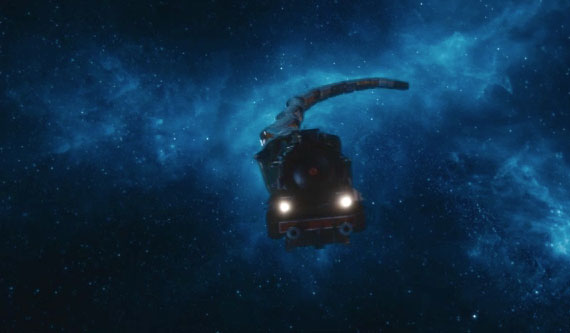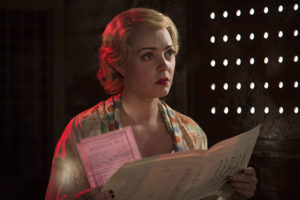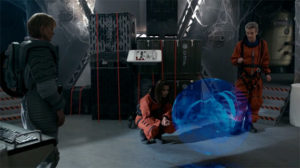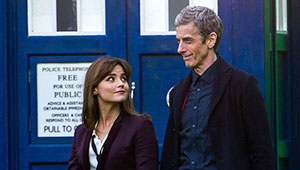Doctor Who and The Hype Train
Connor Johnston tackles pre-broadcast hype and fan expectations.

As Series 8 continues to fly past us showing no signs of slowing down, (One might even say “full steam ahead” to cater for this weekend’s episode) we can be forgiven for very easily losing ourselves in the excitement and the buzz surrounding both the new episodes and the integration of the new Doctor. However, due to both the rarity of new Doctor Who episodes and the show’s historic legacy, these adventures already entail a certain level of excellence to live up to.
Gone are the days of 1963 where Doctor Who was an indulgence, a Saturday afternoon treat appreciated for what it was: An adventure unlike anything else on TV. With its success and its antiquity, Doctor Who has raised its own benchmark – but the question needs to be asked, has it also indirectly raised the expectations of fans to unrealistic heights? Or can this potentially detrimental ideology be attributed to the fans themselves? Looking over the more contrasting responses to the last few episodes, particularly on this very site, it seems more and more like external factors are being blamed or at least partly attributed for particular Whovians personal levels of enjoyment.
Today, I’ll be looking at just a few of these “external factors” that people have seemed to attribute their own dislike of an episode to, and share why I personally feel that in many cases they tend to be unjustified.
BBC Hype/Publicity
 Put pure and simple: Doctor Who is a business. It’s a money maker for the BBC mainly through international distribution and merchandise. To achieve the most successful reception and therefore the most successful outcome for Doctor Who – the BBC and the production/publicity crew (mainly Steven Moffat) are within every right to hype up the series. In fact more than a right or an obligation: It is their job! So of course, theirs is always going to be somewhat biased and positive because a fair amount of the show’s success relies on it. Naturally they want to reach a large audience and hook people with big statements.
Put pure and simple: Doctor Who is a business. It’s a money maker for the BBC mainly through international distribution and merchandise. To achieve the most successful reception and therefore the most successful outcome for Doctor Who – the BBC and the production/publicity crew (mainly Steven Moffat) are within every right to hype up the series. In fact more than a right or an obligation: It is their job! So of course, theirs is always going to be somewhat biased and positive because a fair amount of the show’s success relies on it. Naturally they want to reach a large audience and hook people with big statements.
However, this doesn’t mean that their hype and appreciation is untrue, not genuine or simply for show – If anything the exact opposite! Aside from a sense of responsibility, we must remember that the people who invest the most blood sweat and tears into creating the show we watch and love will be proud of their work and naturally want to get people excited and hopefully share in it.
Looking at some of the relevant examples of opposition to the BBC’s hype it’s evident a vast majority of it revolves around Steven Moffat and writer Peter Harness classing the argument between the Doctor and Clara as “changing everything”. Now whether you found yourself agreeing or disagreeing with this statement, no one can deny that there is support for both sides of the debate meaning that this statement cannot be classed as false or misleading, only that it is objective – though obviously believed by the show runner. This could only mean that possibly any judgement on the comment could be premature, given we haven’t seen the ramifications of Clara’s completely unpredictable actions on how the Doctor conducts himself.
Pre-broadcast Previews/Reviews

A growing trend regarding post-episode opinion these days seems to be the mentioning of – or rather complaints about – how an individual’s personal enjoyment of the episode has been ‘ruined’ due to their prior expectations being decided by how another individual person with their own individual opinion had received the episode in pre-broadcast previews/reviews. One thing that a lot of people seem to be forgetting is that when it comes to differences of opinions between two fans (Yes reviewers are counted in that description), there is a right and a wrong way to approach the situation. Just because someone has an opinion that either is A) Not aligned with your own and or B) Not the view of the majority of fans does not make the opinion itself wrong.
Disagreements are great fuel for entertaining civil and respectful debates, not excuses to denounce anyone’s reviewing skills unjustly. Calls that reviewers should be condemned or that their opinions are “wrong” or “easily pleased”/”to hard to satisfy” are not only unacceptable when it comes to tolerance of other people’s views, but also becomingly ignorant. Any review – be it on this site or another – will always be challenged because opinions vary and they are written with the intention of portraying the author’s individual honest and genuine opinion – we would expect nothing less. They’re not lying to you just because you disagree. You were not cheated.
Ultimately the final point that you’ll find continually stressed throughout today’s article is that no none should blame other people or other external factors for particular episodes not living up to your own personal hype. That’s an issue that can only be attributed to your own self. This message might come across as blunt or rude, but it’s not intended to offend – rather defend people and forces that are being unfairly criticised.
The Dreaded Checklist

Without doubt we all have little things deep in our hearts that we hope one day come up in Doctor Who: personal wish lists of cameos, plot points, twists, theories – the list goes on! Of course there’s nothing wrong with that in the slightest – that is until we start rating episodes down for not including certain things whose absence is not detrimental to the plot.
An example of this can be found in the recent reception to the sixth episode of Series 8: “The Caretaker”. Coal Hill School in retrospect will always be one of the best settings to host a cameo return of one of the Doctor’s first companions, Ian Chesterton. There is no doubting that. However due to the fact that such a legendary character deserved more than simply a cameo and the fact it would have served nothing to the plot, when we finally arrived at Coal Hill the cameo of Ian never came. Of course some disappointment is understandable, but issues seem to arise when we rate episodes lower for what they didn’t include. Be it cameo or plot twist, reference or character death: We should not be rating episodes for what they are not, and in turn ignore the brilliance we are given.
Of course there are always going to be different routes an episode can take that will appeal to different people – but at the end of the day wanting an episode to in essence end up being a different episode is no excuse to rate it down. Especially when we realise how little Who we do get. Why not spend our time analysing, criticising and appreciating what we are given rather then re-writing plots to meet our own personal wish list. We must remember: Steven Moffat is not a genie promising to grant our most indulgent nostalgic wishes – (We had enough nostalgia for the 50th Anniversary!); he is a show runner aiming to create a unique, successful and innovative series.
Science Fiction VS Science Fact

Once again bringing some relevance to the most recent episode “Kill the Moon” – there were many negative reactions based on the somewhat questionable scientific logic of the episode. Granted there were some points to the plot that raised questions in regards to our own logic in reality, but what we are forgetting is that Doctor Who is not reality and therefore is not bound to follow its fundamental scientific laws.
Doctor Who is a science fiction television show – if closer to ‘Science Fantasy’ in recent years – and has never and will never be “Science Fact.” In fear of being blunt, if you’re after a show that is completely scientifically and historically accurate then you’re better off switching to the Discovery Channel because a show about a regenerating alien travelling through space and time in a police box that’s bigger on the inside is never going to be accurate in that sense. Science in Doctor Who, being a science-fiction show, has always been moulded and used to meet the demand of what the plot requires.
The very premise of the show is based on things fundamentally impossible, so the question must be asked since when have we been so selective in what we choose to arc up about? We look at “Kill the Moon” and the complaints that some plot points were illogical, then we look forward to next week’s adventure containing a train flying around space! At the end of the day, regardless if an episode isn’t completely scientifically accurate in terms of our logic in reality, I don’t believe that it can be rated down or disliked for such because “scientifically accurate” is something that the show has never been nor ever pretended to be.
“Who” is to blame?

At the end of the day – a personal opinion regarding an episode of Doctor Who is always going to vary in terms of what makes up a person’s personal list of contributing factors. I am in no way saying that negative opinions are in any way unacceptable – because they totally are, due to the fact there’s so much we can learn from our contrasting opinions and stimulating debates. However, when it comes to the funny thing of expectation people shouldn’t blame other people or other external factors for particular episodes not living up to your own personal hype. Not only is it not fair, but its borderline unreasonable.
There is no way that any reviewer, any advertisement, any promotional promises are ever going to be able to magically align with everyone’s post episode opinions at once mainly because for the whole population to have the exact same reception of an episode is utterly impossible. For every person who loves an element of the show, another will disagree. For every person disappointed or feeling overhyped after an episode there is someone feeling completely overwhelmed and satisfied.
So what are the winning ingredients? Acceptance and appreciation. Acceptance that the BBC have every right to not only be proud of their work but advertise it with their biggest bargaining points because at the end of the day Doctor Who’s primary purpose isn’t to fill space, but to grab viewers and make money – and as such they also shouldn’t be blamed for people’s personal hype of an episode. Accepting that the opinions portrayed in advance reviews are nothing set out to trick or cheat – simply that they fulfil their purpose of being a clear representation of one person’s personal reception of the episode. Appreciation of the fact that Doctor Who is at its roots a science fiction show about the impossible becoming possible and of course an appreciation of episodes as they are presented to us– not a judgement on what they weren’t.
Regardless of whether you liked an episode or not, I’m sure we can all agree that there is a definite lack of gratefulness among the fandom as a whole when it comes to new episodes due to this “obligation” thrown onto the production team to make Who better itself every week – which is honestly impossible. Due to the passion of the fan base and the level of expectation we seem to have, even the tiniest bit of disappointment when an episode doesn’t live up to how we play it out in our dreams is magnified and stressed with such fury and attitude that it completely devalues and cheapens all the work put into the creation of the show. Whether you expected an episode to be better or not – the backlash and the blame of this on exterior forces is not what the incredible hard work of both the Doctor Who production team and reviewers that go above and beyond to connect with the winder fan base deserve. And that’s simply my opinion.








